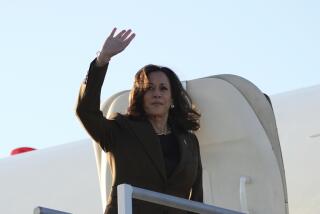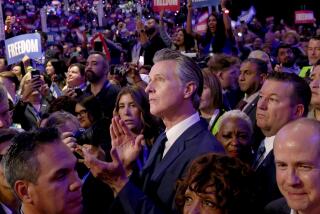Gore Stays on Track With Upbeat Message
- Share via
FAIRFIELD, Calif. — There’s an old saw about the current vice president of the United States that goes like this: Bill Clinton could drive an open convertible through a carwash and Al Gore would get wet.
But that spin on Gore may be more clever than accurate: While President Clinton couldn’t be taking more of a hosing these days, as rumor and allegation rain down on him, his vice president is staying perfectly dry.
And the only distance Gore has put between himself and the president is geographical: The vice president is in the midst of a three-day visit to California that brought him to Santa Monica on Friday night and includes a full schedule in the Los Angeles area today.
Indeed, in appearances with Clinton in the Midwest on Wednesday and alone now in California, Gore has demonstrated an apparently firm belief in the truism of vice presidents: Their future rises or falls on the popularity of their boss.
From Midwest stages before more than 20,000 people whose rafter-shaking cheers punctuated his every praise of the president, to the intimate setting of a computerized police communication center in San Jose, where the gentle click-clack of keyboards offered a contrapuntal rhythm to his earnest inquiries about workplace efficiencies, Gore has stayed on message: touting the successes of the Clinton administration and its plans for the future.
*
And nary a mention, at least in public, of the political morass created by allegations of presidential sexual activities with a former White House intern named Monica S. Lewinsky.
Clinton and Gore have spoken frequently over the last 10 days, and there is little question among those close to them that the president’s difficulty--if not the details of his case--has been a central topic.
With indications that the controversy is settling into the rhythm of a protracted struggle, Gore’s role, according to a senior White House aide, is to “try to be as supportive as he can be of the president, both personally and politically. He believes the president is telling the truth. He believes him as a friend, and that’s his approach to this.”
That bond reflects an evolution of the vice presidential role that began when Jimmy Carter brought Walter F. Mondale into a more central role than any previous vice president.
In California, Gore has quietly gone about his business, engaging in what he might call virtual ribbon-cutting. In Silicon Valley on Thursday, he unveiled a plan to extend tax credits for research. At the San Francisco International Airport on Friday, he announced the impending deployment at 32 major U.S. airports of $100-million worth of new X-ray devices to screen luggage for explosives.
Here, halfway between San Francisco and Sacramento, he touted a solar energy program being advanced by British Petroleum and unveiled a proposal to grant tax credits for the installation of solar panels that provide home electricity or hot water. It is part of a $6-billion program to fight global warming by easing the nation’s appetite for fossil fuels.
Today, Gore will offer more of the same: A $750-million plan to expand classroom Internet access and let parents use computers to keep tabs on how their kids are doing in school. In the San Fernando Valley, he will trumpet the creation of an “empowerment zone,” which offers tax credits to employers who move jobs into impoverished communities.
So, even if Clinton’s situation couldn’t be more unusual for a president of the United States, the business his vice president is conducting couldn’t be more normal.
In that, it is much like the program set by another vice president, Gerald R. Ford, in the months preceding Richard Nixon’s resignation. But Ford’s motivation was different.
“We just went out and did our own thing,” Ford has said of how he handled the vice presidency that fell upon him two months after Spiro T. Agnew resigned from the office in October 1973--and eight months before he inherited Nixon’s presidency.
Ostensibly, Ford’s purpose was to introduce himself to the nation. But he also tried to gingerly put some distance between himself and the increasingly suspect president, said James Cannon, a Ford aide at the time and author of a subsequent biography of President Ford.
At the same time, Ford has said, he was determined to make sure Nixon could never accuse him of undercutting the president.
“I was in an impossible situation,” he said.
Gore has said his support for Clinton goes beyond politics; it is the support of a friend.
And he left little doubt about his enthusiasm for that friend when, three times on Wednesday, he growled out an endorsement with the elan of a revivalist preacher.
“He is the president of the country. He is also my friend. And I want to ask you now, every single one of you, to join me in supporting him and standing by his side,” Gore told a wildly cheering crowd that nearly filled the cavernous Assembly Hall basketball arena at the University of Illinois in Champaign.
Times staff writer Elizabeth Shogren in Washington contributed to this story.
More to Read
Sign up for Essential California
The most important California stories and recommendations in your inbox every morning.
You may occasionally receive promotional content from the Los Angeles Times.










